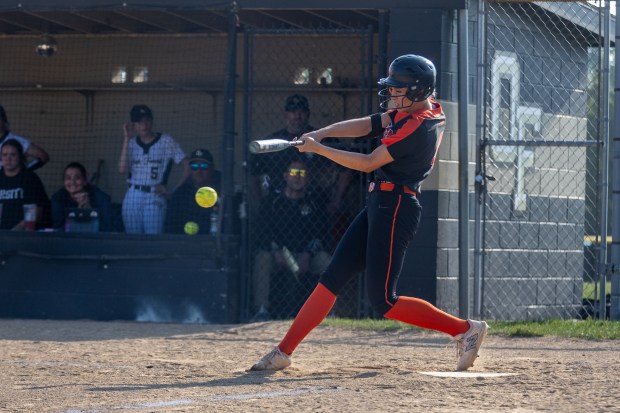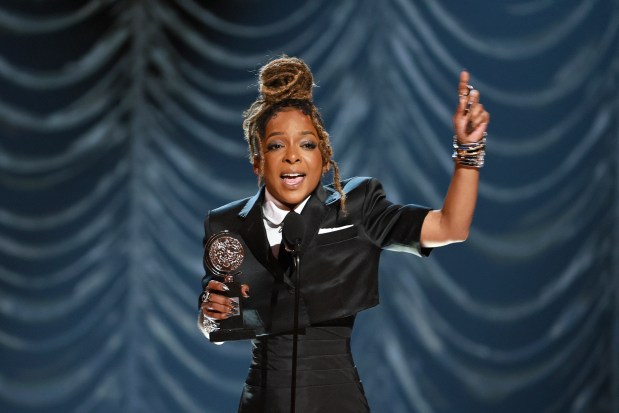Halyna Fedus prays the rosary for her native Ukraine each day, asking God to stave off a Russian takeover and protect the family and friends she left behind when she immigrated to Chicago nearly three decades ago.
She believes Ukraine will persevere, but her homeland needs the help of the United States to preserve its fragile independence — as well as global security and order, which have been at risk since Russia’s Feb. 24, 2022 invasion.
“I pray for the U.S. too. It is the biggest support for Ukraine,” she said at Shokolad Pastry and Café, the Ukrainian Village neighborhood restaurant she opened about 15 years ago.
Fedus added that Ukraine would not have survived this long against the military might of Moscow “without help; everybody knows this.”
“I don’t know how they’re going to survive there,” she added. “They really need this money.”
Supporters of Ukraine across the Chicago area are urging American leaders to continue sending aid to the battle-ravaged nation, as the war approaches its two-year mark later this month.
After months of heated debate, the Senate on Tuesday passed a $95.3 billion aid package for Ukraine, Israel and Taiwan. The measure passed overwhelmingly despite the opposition of a small group of Republicans, who decried the package’s $60 billion in funding for Ukraine and argued the U.S. needs to focus on border security before distributing more funding overseas.
Yet the foreign aid package faces steep resistance in the House, including Speaker Mike Johnson, who criticized the measure for its lack of border security provisions, calling the bill “silent on the most pressing issue facing our country” in a statement Monday.
President Joe Biden said the bill “needs to move” because it provides “urgent funding for Ukraine to keep defending itself against Putin’s vicious, vicious onslaught.”
As for Fedus, she fears for her two brothers who live in the western Ukrainian city of Ternopil with their families, as well as many other relatives and friends back home. She couldn’t sleep for the first few days after the Russian invasion, which ignited the largest European ground war since World War II.
“That stress never goes away,” she said.
Fedus was surprised when she came to her cafe the next day to find it packed with customers who wanted to show their solidarity with Ukraine.
A sign declaring “stand with Ukraine” hangs in the cafe’s front window, facing passersby and the traffic of Chicago Avenue. Patrons can find numerous displays about fundraisers to help Ukraine inside the cafe, along with the menu of Ukrainian borscht, many desserts and an array of varenyky, Ukrainian pierogis.
Yellow and blue Ukrainian flags wave in front of homes, businesses and churches dotting the surrounding neighborhood. Fedus said she has been proud of the outpouring of support for Ukraine amid the war from the Chicago area as well as the nation.
The 63-year-old grew up when Ukraine was under the rule of the Soviet Union and recalled the joy and sense of newfound liberty after her nation declared its independence in August 1991.
She believes Ukrainians won’t let go of that hard-won sovereignty.
“Freedom,” she said. “It’s freedom. When you can speak in your language. Just to be independent. Culture. Food. Everything. Just to be free.”
Obligation, self-interest
Ukraine is essentially fighting the war against Russia for the entire world, said Alberto Coll, law professor at DePaul University and an expert in international law and U.S. foreign relations.
“For the United States, in a sense we’re not doing Ukraine a favor. They are in a sense fighting the war for all of us,” said Coll, who served as principal deputy assistant secretary of defense during the George H.W. Bush administration. “And those Ukrainians who are giving their lives are really giving their lives not just for Ukraine but for all of us. Because it means that they are helping to deter Russia and make it very clear that military conquest will not pay.”
Allowing Russia to prevail in Ukraine would mean Moscow would be in a position to threaten other American allies in Europe, particularly those in eastern Europe and the Baltics, which are very vulnerable, he added.
Coll suggested those members of Congress who favor cutting off aid to Ukraine should travel there and experience the war.
“Frankly, I am disgusted by those members of Congress that voted against aid to Ukraine,” he said. “I think they should be ashamed of themselves and I think they should be sent there to spend a month in Ukraine … talking with Ukrainians and seeing what the war is like. I think they would come back very changed and they would understand why it is not just the right thing to do but it’s also the sensible and the smart thing to do, to help them.”
DePaul history professor Tom Mockaitis said the war has “settled into a war of attrition.”
“It looks a lot more like a World War I stalemate than a World War II war of maneuver. What that means is victory — or survival — goes to whoever can outlast the other,” said Mockaitis, author of the book “Conventional and Unconventional War: A History of Conflict in the Modern World.”
This “puts Ukraine at something of a disadvantage,” he said.
“Russia is larger. It has a bigger population. It has more resources. It has been able to keep its economy running,” he said.
Mockaitis added that Ukraine is “in serious trouble.”
“Dwindling manpower and shortages of munitions, particularly artillery shells, is limiting their ability to conduct operations,” he said. “Still, it is unlikely Russia will achieve a major breakthrough.”
Meanwhile, Putin has “dug in” and indicated he won’t back down or negotiate, said Jordan Gans-Morse, associate professor of political science and the faculty director of the Russian, Eurasian and East European Studies Program at Northwestern University.
“He’s convinced, and maybe not without cause, that … he can wait out the West,” he said. “And that the West, because many of these countries are democratic, ultimately is going to have a change in leadership, a change in public opinion, and is going to waver. He doesn’t even think it’s going to take that long.”
‘Making us much safer’
Aiding Ukraine now is in the self-interest of the United States, Gans-Morse said.
What’s often misunderstood is that a very large portion of these funds are not directly sent to Ukraine; much of the money instead goes to the U.S. defense industry to buy ammunition or weapons for Ukraine, or to replace weapons that have been sent from the American arsenal to Ukraine.
“Normally politicians, including Republicans, are begging for these types of funds to be disbursed to their districts — after all, they create local jobs,” Gans-Morse said. “So this simply isn’t a case of a choice between helping Ukraine and doing something to help Americans. Much of…our military aid in fact does both.”
For the U.S.’s own security interests, aid to Ukraine is a “no-brainer,” he said.
“For what is relatively little cost from our side, we are doing something … that is making us much safer and Europe much safer compared to what would be happening if Ukraine were losing,” he said. “That to me is the basic message that Americans are not getting clearly enough.”
Many Americans still favor providing aid to Ukraine, though support seems to decrease the longer the war continues.
A Pew Research Center survey released in December found 29% of Americans say the United States is providing the right amount of aid to Ukraine, whereas 18% say the money is not enough and 31% criticized the funds as being too much. [comment=”cq” ]
At the start of the war, support was much higher: Roughly 32% of Americans found aid to Ukraine adequate and only 7% responding that it’s too much money; 42% of respondents for the United States to give more, according to a Pew survey released in March 2022, shortly after Russia’s invasion of Ukraine launched the largest land war in Europe since World War II. [comment=”cq” ]
Many Illinois lawmakers — including U.S. Sens. Tammy Duckworth and Dick Durbin — have championed continued aid to Ukraine.
Durbin applauded the Senate’s passage of the foreign aid package, noting that it sends an important message to “the Ukrainian people fighting for their freedom: we will not walk away from your battle.”
“Now, I urge the House to act quickly to be on the right side of the battle in Ukraine and the right side of history,” Durbin said in a statement Tuesday. “Do not bow to the whims of former President Trump — take up this bipartisan measure without delay.”
U.S. Rep. Mike Quigley, co-chair of the bipartisan Congressional Ukraine Caucus, was the lone Democrat who voted against an emergency funding plan in September that averted a federal shutdown, citing the measure’s lack of aid to Ukraine.
“Letting Putin win in Ukraine isn’t an option,” Quigley posted recently on X, the social media site formerly known as Twitter. “We must help Ukraine save democracy and the future of the free world as we know it.”
The Associated Press contributed.





